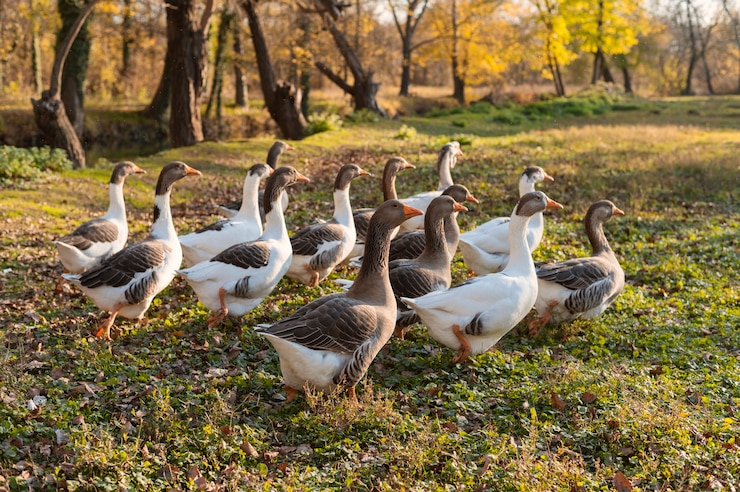Sustainable farming practices for gamebirds, waterfowl, and other poultry can help ensure the long-term viability of these species while also providing feathered delights for consumers. Here are some key considerations for sustainable farming:
- Habitat and Space: Provide appropriate habitat and space for the birds to thrive. This includes access to open areas for foraging, suitable nesting sites, and clean water sources. Creating a natural and diverse environment can enhance the birds’ welfare and promote their natural behaviors.
- Grazing and Foraging: Incorporate rotational grazing systems and allow birds to forage on natural vegetation. This not only provides a more varied diet but also helps control pests and promotes soil health through natural fertilization.
- Organic and Non-GMO Feed: Opt for organic and non-GMO (genetically modified organisms) feed to minimize the use of synthetic pesticides, herbicides, and antibiotics. This supports the health of the birds and reduces the environmental impact of farming.
- Conservation and Biodiversity: Implement practices that promote biodiversity on the farm, such as planting native vegetation, preserving wetlands, and protecting natural habitats. This can create a balanced ecosystem, support local wildlife, and maintain the natural heritage of the area.
- Animal Welfare: Ensure the welfare of the birds by providing appropriate shelter, ventilation, and protection from extreme weather conditions. Minimize stress during handling, transportation, and processing. Access to natural light and outdoor spaces should be provided whenever possible.
- Disease Prevention: Develop a comprehensive disease prevention program to minimize the use of antibiotics and prevent the spread of diseases. This includes proper biosecurity measures, regular veterinary check-ups, and appropriate vaccination protocols.
- Water Management: Implement responsible water management practices, such as collecting and recycling rainwater, using efficient irrigation systems, and minimizing water pollution from farm activities. Conserving water resources is essential for sustainable farming.
- Local and Direct Sales: Consider direct sales to consumers, restaurants, or local markets to reduce the carbon footprint associated with transportation and packaging. This also helps build connections with the community and allows for better control over product quality.
- Traceability and Certification: Maintain clear records of the farming practices and ensure traceability throughout the production chain. Seek certification from reputable organizations that verify sustainable and ethical farming practices.
- Continuous Improvement: Regularly evaluate and improve your farming practices based on feedback from consumers, experts, and industry developments. Stay informed about advancements in sustainable agriculture and adapt your methods accordingly.
By adopting sustainable farming practices, producers can contribute to the preservation of gamebirds, waterfowl, and other poultry species, while also meeting the growing demand for ethically and environmentally conscious food choices.
Join 'Farmers Mag' WhatsApp Channel
Get the latest Farming news and tips delivered straight to your WhatsApp
CLICK HERE TO JOIN






